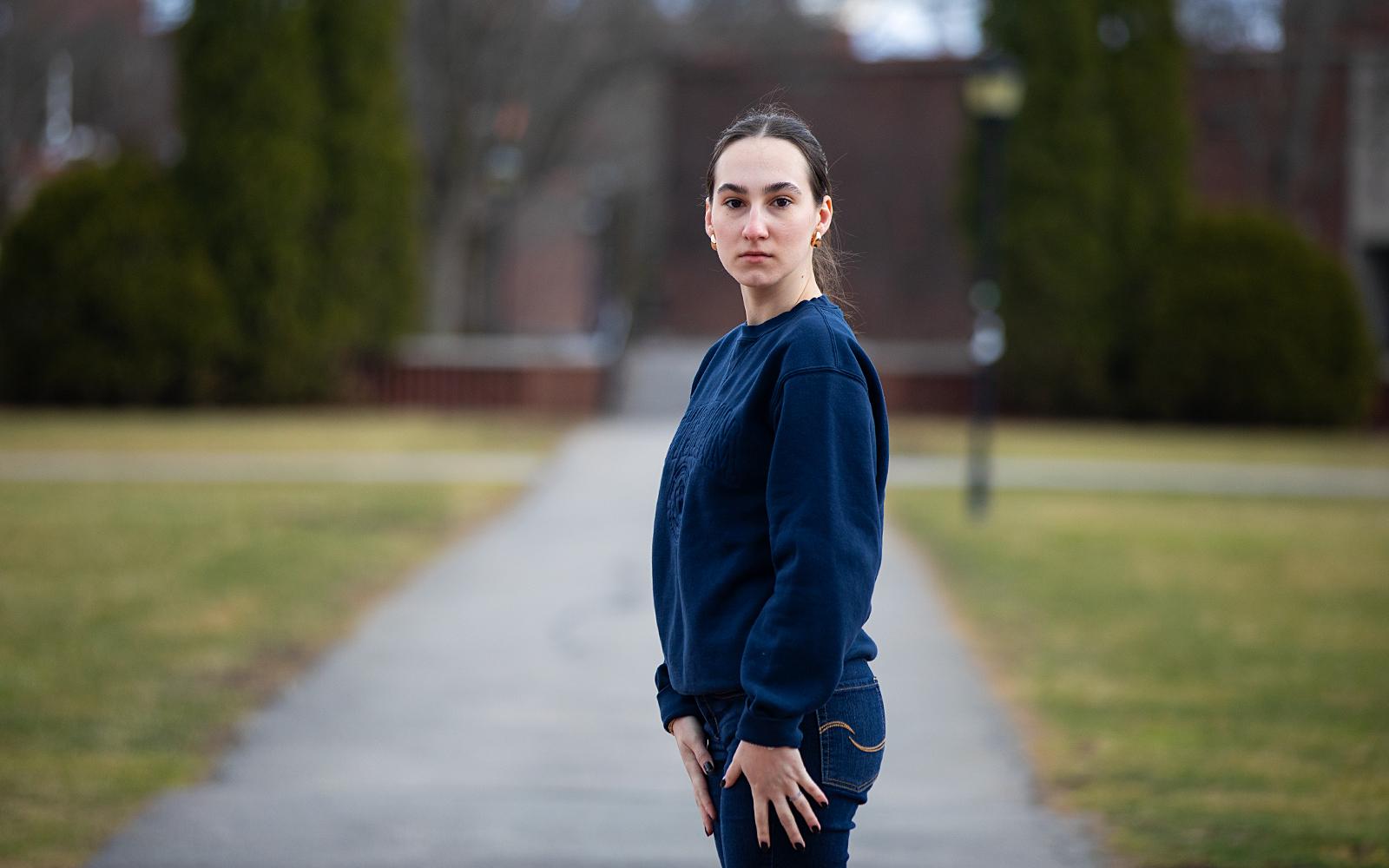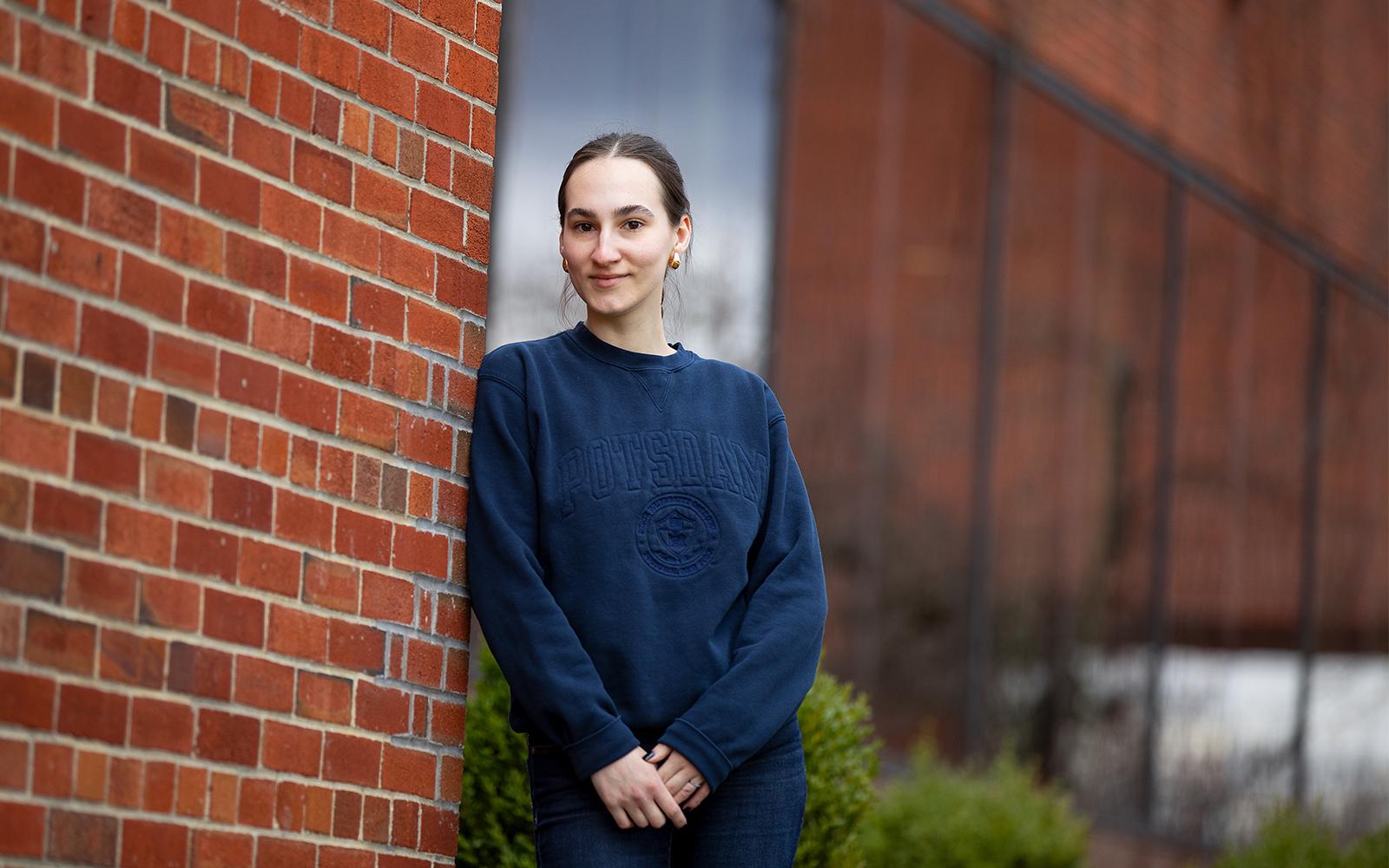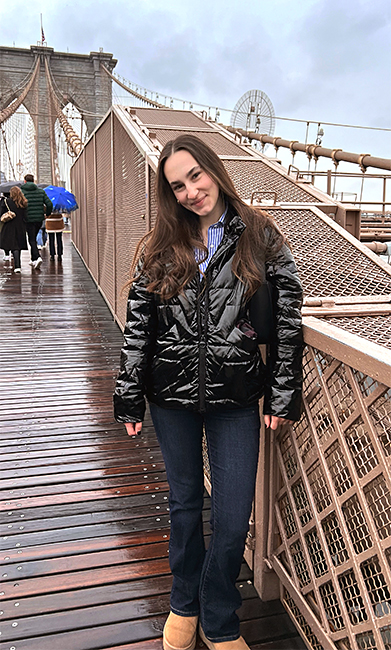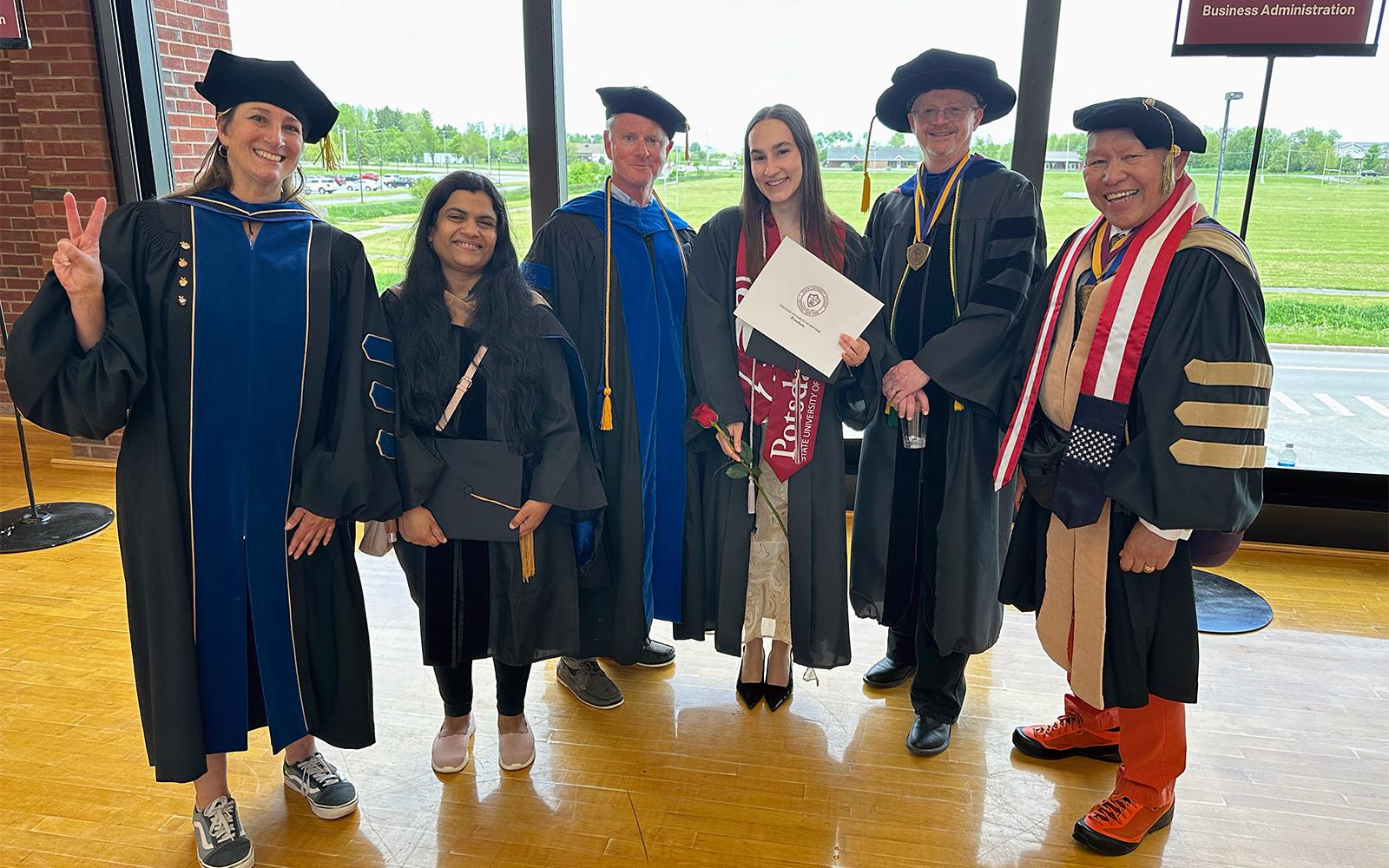In the first few semesters of her college studies at the Kyiv National Economic University, Stephanie Bulakh ’24 did her best to tune out the background noise and focus. But with her country at war, she couldn’t help but hear the change taking place all around her.
“I can now distinguish the noise of different weapons, just because it was very close to us. I can say whether it was an explosion, whether it didn’t explode, and whether it’s a rocket or a drone,” she said. “Near my house was a place where military soldiers were trying to practice how battle works. When they would destroy mines, I could hear that. Because of that, my house was shaking while I was trying to work.”

Stephanie had already been studying online from home following the pandemic when her whole world changed—as Russia launched a full-scale invasion of Ukraine on February 24, 2022.
“It was very early in the morning on a Thursday. We were, just me and my dad, in different floors in the house. We woke up from the explosions. The first thought I had, I imagined from those movies of World War II, when the Germans flying planes just dropped bombs. It was a very scary moment when we opened the news and saw Putin saying they were invading,” she said.
Fierce battles were raging not far from their home in a suburb on the outskirts of Kyiv, as Russian forces attempted to invade the capital. The family quickly arranged to shelter in the basement of their church, where Stephanie’s father is a minister, along with 60 to 70 other people. They ended up staying for weeks, sleeping on the floor in sleeping bags, helping the other families staying there, and praying together.
“It was very scary. The walls were very thin, and at night, we could hear as people were killing each other,” she said.
Such scenarios weren’t completely new, sadly, to the country. Eight years earlier, Russia had annexed Crimea and shortly thereafter began a war for control over the Donbas region.
“I know people who left the eastern part of our country in 2014, and others who lived in a basement for two years because they were trying to survive. For me and my family, we had helped people a lot from eastern Ukraine."

Less than a month into the full-scale attack on the country, the massive new shopping center and business complex directly across the street from Stephanie’s church in Kyiv was attacked in an airstrike, killing at least eight people.
“When we were in church, there was a very big explosion, a very big ballistic rocket going to the shopping mall 100 meters away from us. Our windows had to be replaced because they were crushed. This was the most massive explosion I had experienced,” Stephanie said. “When they attacked the shopping mall, it turned out that there were a lot of soldiers, so it was a massive attack that killed a lot of people… our soldiers trained to defend us.”
Eventually, as Ukrainian forces drove Russian soldiers from Kyiv and the surrounding areas, Stephanie and her family felt ready to return home. They were horrified to hear of the atrocities that had occurred in the localities of Bucha and Irpin, only miles from their house. They followed the news closely and stayed in touch with family and friends elsewhere in the country.
“Fortunately, luckily—thank God—everything is all right with my family, with my house…
I know people who left in the beginning because they were so scared. I didn’t leave, just because of my family. I knew my dad would not leave, so this was my main reason to stay,” she said. “For me, this was very important. I saw that I would never forgive myself if something happened to them.”
As time went on, Stephanie found strength in working toward the things she could control—completing her studies, volunteering her time and supporting her family.
“I became more confident. I know that what will be, will be. I was so sure in everything. I was the person sleeping until 8 a.m., while the whole family was calling a lot. I was sleeping as a baby despite everything,” she said. “I had something that I was anticipating for—coming to America.”
As it turned out, Stephanie’s university, the Kyiv National Economic University named after Vadym Hetman (KNEU), had been in talks with SUNY Potsdam for more than a decade about creating a dual degree program. The partnership, long in the works, had just been approved, despite the war.
Now, she had the chance to earn two degrees in four years—a Bachelor of Science degree in business administration from SUNY Potsdam, and a bachelor’s degree in international economics from KNEU at the same time. She would finish her first three years of study in Ukraine, and then in her senior year, she would start with a semester of online study at SUNY Potsdam before arriving on campus for the spring.

Photo by Jesstine Avadikian
“I was always interested in doing something in English, and I also was into mathematics. I was thinking the closest field to that was economics. Then I found out there was an opportunity at my university to study fully in English. I just decided this is the right thing, this is what I want to do,” she said.
Stephanie made time to tutor peers and children in English as well, donating the proceeds to the war effort.
“I wanted to do something good. I couldn’t donate a lot, but my money which I earned went straight to the nation. I was happy that I could help kids, future generations, develop their skills,” she said.
Last August, Stephanie received word that someone she was close to had died in the war. She counts her blessings that such tragedies have not yet hit her immediate loved ones, but she knows many who are reeling from losses.
“I have a person I know personally who died this [past] August at the age of 21. When he was 20, he became a volunteer in military service. He went to defend our land,” she said, wiping away tears. “I know people whose relatives are dead. There was a girl who was going to come to America with me who is living now in Austria because her home was destroyed. Now she can’t return.”
Her initial classes at KNEU were mostly online, due to the conflict. But beginning this fall, Stephanie was able to attend some in-person classes at the Ukrainian university—sometimes punctuated with bouts of sheltering in the basement there, due to air-raid alerts—along with starting her online courses at SUNY Potsdam. She also started planning for her studies on campus, including a bus trip to and from Poland in order to apply for her student visa, which also gave her a chance to visit her best friend, who had fled to Poland due to the war at home.
 Finally, in January 2024, Stephanie said goodbye to her family and flew to New York City. When she arrived, a group of Ukrainian expats picked her up at the airport and even drove her by the city skyline at midnight, just so that she could see it. She stayed with them for a few hours before they brought her back to the airport in the morning for her flight to Syracuse, where Professor Dr. Greg Gardner picked her up. As they traveled north to the campus, she marveled at different sights that she had been waiting to see.
Finally, in January 2024, Stephanie said goodbye to her family and flew to New York City. When she arrived, a group of Ukrainian expats picked her up at the airport and even drove her by the city skyline at midnight, just so that she could see it. She stayed with them for a few hours before they brought her back to the airport in the morning for her flight to Syracuse, where Professor Dr. Greg Gardner picked her up. As they traveled north to the campus, she marveled at different sights that she had been waiting to see.
“The first thing I kept noticing was big trucks—and women in big trucks too. I also liked seeing the traditional American houses like you see in the movies,” she said. “I feel the nature here. My windows look out on a field and trees, and when I walk, I can smell the smell of someone grilling. It reminds me a bit of the forests on the outskirts of Kyiv. I’d really like to travel to see more. There are a lot of different landscapes within all of the states.”
Stephanie finally got her chance to catch the major sights of New York City during a spring break trip.
“New York City was great! I'm sincerely grateful to Dr. Gardner and his wife Jeanne for taking me to the city,” she said. “The weather was pretty disappointing, but it doesn't really matter when your dream comes true!”
Back on campus, she was wrapping up five different classes, including three business courses, along with human biology and hiking. Stephanie’s business administration classes included Strategic and Global Management, Ethical Issues in Business, and Human Resource Management.
“I really like how the professors are like friends to you, very open and welcoming. They just want to help."

In contrast to her Ukrainian studies, she was pleased to find the classes incorporated group projects and competitions based on real-world scenarios—and was inspired by her female classmates as well.
“Girls are very competitive in the business field here. That’s something I don’t always see at home. It’s not very common for us but it’s a trend that I like. I do not feel alone. I’m trying to be active and energetic,” she said. “Being socialized is very important for me. What I really like in my classes is that we cooperate in teams and closely get to know each other. You get to know more about different cultures. It educates you and develops your horizons.”
She also enjoyed getting to take part in campus life, joining in activities and attending services at a church downtown.
“What I really like is the unity in terms of sports, like at the hockey games, when the kids are screaming the same way as older people. I really liked the Winterfest activities too,” she said.
As she walked across the stage at Commencement, Stephanie was full of dreams for her future—both for herself and for her homeland. She is officially the first graduate of the dual degree program, and her family, friends, professors and classmates in Ukraine were eagerly watching the livestream of the ceremony online.

Stephanie is currently applying to graduate programs across the country, with the hope of staying in America a little longer to earn a master’s degree. Those are experiences and credentials she intends to put to good use back home.
“We will need to restore our country. We will need to invest. We will need to do a lot of things. Thinking of people who I know who died, that is the price for our victory for our country—but we don’t want to just lose it, for it to be for nothing. We are going to get all of our parts, all of Ukraine, under one flag, under one language,” Stephanie said. “I want my kids to live in a peaceful country.”
As she looks to a brighter future, she is clear-eyed about what will be needed to support that recovering country and population—and what role she can play.
“I want to try to build something. There are countries out there having demographic problems, that need a skilled workforce. That’s what I want to do. Right now, I want to get educated as much as I possibly can, with the opportunity to stay here and gain more English skills. People I know may be future investors,” she said. “If I came here two years ago, I wouldn’t have had the confidence in myself to do this. Timing is everything, and this is just the right time for me.”
Article by Alexandra Jacobs Wilke. Portraits by Jason Hunter, commencement photos by Jesstine Avadikian
